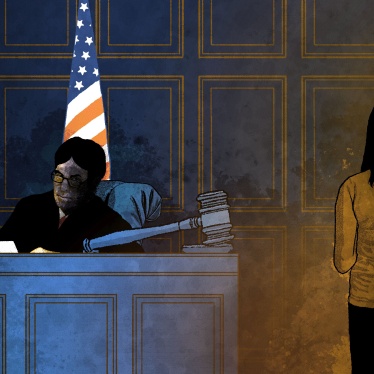Human Rights Watch urges Nebraska to pass Legislative Bill 843, which will abolish the sentence of life without parole for children in Nebraska. Such a sentence is not only cruel and inappropriate, but also a violation of international law; and the United States is the worst violator with 2,381 juvenile offenders currently sentenced to life without parole. We are deeply concerned that racial discrimination enters into the determination of these sentences for children. Nationwide, African-American youth serve life without parole sentences at a rate that is ten times higher than that of Caucasian youth.
Chairman Brad Ashford
Judiciary Committee
Nebraska Legislature
Room 1103, State Capitol
Lincoln, NE 68509
Dear Chairman Ashford and Members of the Judiciary Committee:
Human Rights Watch urges Nebraska’s Judiciary Committee to vote in favor of Legislative Bill 843, which will abolish the sentence of life without parole for children1 in your state. We oppose life without parole for juveniles because it is cruel, inappropriate (particularly so given recent scientific research), and a violation of international law.
Human Rights Watch has been analyzing the issue of life without parole sentences for children since 2004. In the past four years, our research has culminated in three publications: The Rest of Their Lives: Life Without Parole for Child Offenders in the United States (a 2005 report on juveniles sentenced to life without parole throughout the United States); Thrown Away (a 2005 report on life without parole for juveniles in Colorado); and, When I Die They'll Send Me Home (a 2008 report on life without parole for juveniles in California). Based on our research, we urge the Committee to vote in favor of Legislative Bill 843 for three main reasons.
First, in Roper v. Simmons, 543 U.S. 551, 561 (2005), the US Supreme Court found that the differences between juveniles and adults render suspect any conclusion that a juvenile falls among the worst offenders. Neuroscience reveals the process of cognitive brain development, including the formation of impulse control and decision-making skills, continues into early adulthood—well beyond age 18. The fact that juveniles are still developing their identity and ability to think and plan ahead means that even a heinous crime committed by a juvenile is not “evidence of an irretrievably depraved character.”2
The sentence of life without parole was created for the worst criminal offenders, who are deemed to have no possibility of reform. While the crimes they commit cause undeniable suffering, juvenile offenders are not the “worst of the worst.”
Moreover, Human Rights Watch estimates that 59% of the youth serving life without parole in the United States received this sentence for their very first offense—they had no juvenile or adult criminal record whatsoever prior to the offense that resulted in their life sentence. We also estimate that 26% of the youth serving the sentence of life without parole in the United States received it for aiding and abetting or felony murder.
Second, the United States is the world’s worst human rights violator in terms of sentencing youthful offenders to life without parole. There are currently 2,381 persons serving the sentence of juvenile life without parole in the United States; as of February 2008, to our knowledge, not a single youth is serving this sentence anywhere else in the rest of the world.
International human rights law prohibits life without parole sentences for those who commit their crimes before the age of 18, a prohibition that is universally applied outside of the United States. The United Nations Convention on the Rights of the Child (CRC) explicitly addresses the contradiction between the particular rights and needs of children and life without parole sentences.3 Underpinning several of the treaty’s provisions is the fundamental recognition of the child’s potential for rehabilitation. Recognizing the unacceptability of sentences that negate the potential of children to make changes for better over time, Article 37(a) of the CRC flatly prohibits sentencing children to life without the possibility of parole.4
Third, we are deeply concerned that racial discrimination enters into the determination of which youth serve life without possibility of parole sentences, and which youth enjoy the possibility of release. Nationwide, African-American youth serve life without parole sentences at a rate that is ten times higher than that of Caucasian youth.5 In Nebraska, racial disparities in sentencing practices raise serious concerns: African-American youth arrested for murder are sentenced to life without parole at a rate that is 1.23 times higher than it is for Caucasian youth arrested for murder.
Children can and do commit terrible crimes. When they do, they should be held accountable and face appropriate consequences. Children are different from adults, however, and the punishment imposed for their offenses should reflect their age and level of development. At a minimum, laws should preserve the opportunity for parole for juvenile offenders, and the ability to review whether someone sentenced to life in prison as a child has been rehabilitated.
For the foregoing reasons, Human Rights Watch urges Nebraska to take the opportunity to make its laws more just and eliminate the sentence of life without parole for children by enacting Legislative Bill 843.
Thank you for your consideration, and please feel free to contact me if I can provide you with any further information.
Sincerely,
Carol Chodroff
Advocacy Director, US Program
1 The terms "children" and "juveniles" in this letter refer to anyone who was below the age of 18 at the time of the offense.
2 Id. at 570.
3 Convention on the Rights of the Child (CRC), adopted November 20, 1989, entered into force September 2, 1990, available at: http://www2.ohchr.org/english/law/crc.htm.
4 Although the United States has not ratified the Convention on the Rights of the Child, it is a signatory. As such, it has the obligation to refrain from actions which would defeat the treaty’s object and purpose.
5The Rest of Their Lives: Life Without Parole for Child Offenders in the United States, p. 39 (2005).






